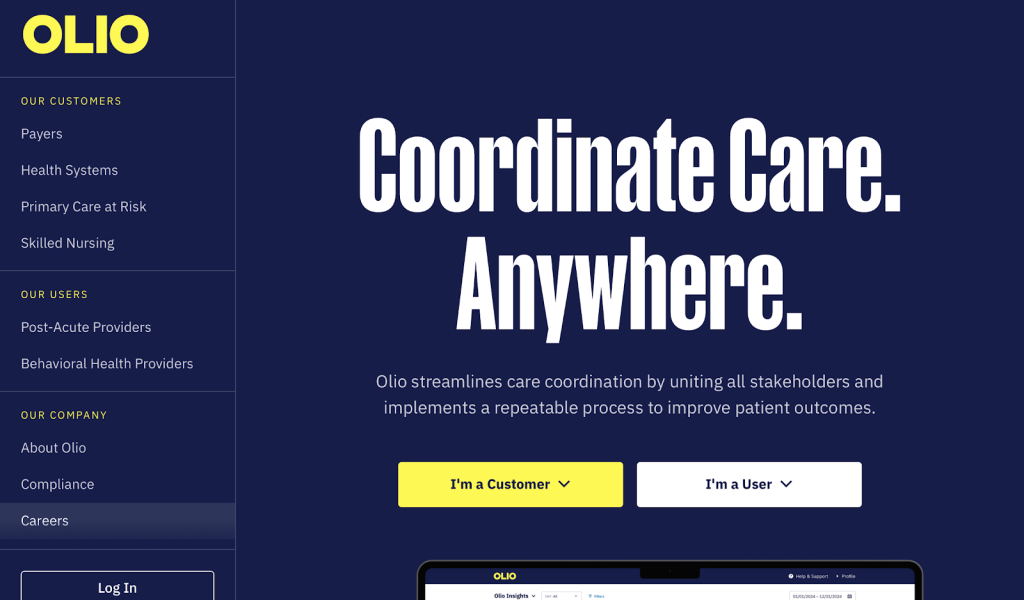Olio Secures $11M Series B to Transform Post-Acute Care Coordination
July 14, 2025
byFenoms Startup Research

Olio, a U.S.-based healthtech startup, has raised $11 million in Series B funding, signaling strong investor confidence in its mission to streamline communication and collaboration between hospitals and post-acute care providers. The round was led by Fulcrum Equity Partners and Mutual Capital Partners (MCP), with continued support from existing backers. CEO Ben Forrest continues to lead the company into its next phase of growth.
Reimagining Care Coordination
The U.S. healthcare system has long been challenged by fragmented communication, especially when it comes to the transition of patients from hospitals to post-acute care facilities. Olio offers a platform that connects health systems with post-acute providers in real-time, enabling case managers, physicians, and skilled nursing staff to share updates, track outcomes, and flag issues - all in one interface.
This level of coordination is crucial, especially given the growing pressure on hospitals to reduce readmissions and improve patient outcomes under value-based care models.
"Our mission is simple - keep patients healthier by keeping everyone in the loop," said Ben Forrest, CEO and co-founder of Olio. "Too often, patients fall through the cracks after discharge. We’re here to close those cracks."
Post-acute care inefficiencies cost the U.S. healthcare system over $75 billion each year, according to the Medicare Payment Advisory Commission. A significant portion of hospital readmissions can be traced to communication failures, disjointed care plans, or lack of follow-up during transitions to skilled nursing or rehabilitation facilities.
Olio’s platform makes collaboration measurable, not just possible. Unlike traditional EHR systems or phone/email workflows, Olio provides structured daily workflows, patient progress tracking, and analytics that give hospital partners visibility into what's happening outside their walls.
This clarity of outcomes becomes even more important as hospitals move into risk-based models, where every poor handoff translates to real dollars lost.
What makes Olio especially sticky is that it doesn't try to replace existing EHRs - it rides alongside them, inserting itself where the communication gaps are widest and most painful.
One of the fastest paths to scale in regulated industries is to embed your product between broken workflows, not try to replace the systems that are legally or culturally immovable. Olio isn’t disrupting hospitals’ core systems - it’s bridging the operational dead zones those systems can’t touch. Founders building in complex industries should ask: Where is the communication falling apart? If your product can patch those gaps and deliver measurable ROI within 30 days, you're not just a tool - you become operational infrastructure.
The Market Opportunity in Post-Acute Care
The U.S. post-acute care market is massive. According to Precedence Research, the market for post-acute services is expected to reach $520 billion by 2030, driven by an aging population, chronic disease burdens, and the push for value-based care.
Hospitals and health systems are under increasing regulatory scrutiny to ensure smooth transitions of care - yet many still rely on outdated tools like fax, spreadsheets, or siloed communication apps. The demand for real-time, interoperable, and actionable platforms is skyrocketing.
Simultaneously, the broader digital health market is booming. Per McKinsey, adoption of digital health tools among providers doubled from 2019 to 2022. Over 90% of health systems now consider care coordination platforms critical to success in value-based care programs.
Moreover, CMS (Centers for Medicare & Medicaid Services) has rolled out a series of bundled payment programs and incentives for providers that can demonstrate lower readmission rates and improved continuity of care - metrics directly impacted by platforms like Olio.
These macro forces are converging into one truth: Hospitals can no longer afford poor visibility into what happens after discharge. The regulatory, financial, and reputational costs are too high.
Olio is already working with hundreds of care providers, facilitating smoother discharges, tighter collaboration, and measurable reductions in readmission rates. As more systems seek digital-first solutions, Olio is well positioned to become the go-to platform for post-acute care engagement.
Where the New Funding Will Go
With this new $11 million infusion, Olio plans to:
- Expand its engineering and product teams to enhance platform capabilities
- Scale go-to-market operations, including sales and customer success teams
- Invest in analytics and AI-powered insights to further drive provider accountability
- Grow its network of post-acute partners and hospitals, ensuring national coverage
The funding round also reflects a growing trend of healthcare startups leaning heavily into value-based partnerships rather than traditional fee-for-service relationships. Investors recognize that Olio’s data-driven approach not only improves outcomes but also aligns directly with the financial incentives of modern healthcare systems.
About the Investors
Fulcrum Equity Partners has a strong track record in backing healthtech and SaaS businesses that optimize critical workflows. Their involvement brings operational expertise and a deep understanding of scaling in complex regulatory environments.
Mutual Capital Partners (MCP), meanwhile, continues to show strong conviction in Olio's vision, having supported the company in earlier stages. MCP is known for investing in capital-efficient, high-growth B2B startups in healthcare and beyond.
What’s Next for Olio
As the healthcare industry continues its seismic shift toward accountability, transparency, and patient-centricity, Olio is building the infrastructure to support that future.
The company is already demonstrating tangible improvements in key hospital metrics, such as reduced length of stay, better discharge communication, and improved patient satisfaction scores. These aren’t just nice-to-have outcomes - they’re survival metrics for hospitals in today’s competitive landscape.
And as Olio builds out predictive analytics and deeper integrations with EHRs, its value to healthcare systems will only deepen.









